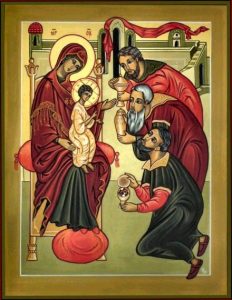 The Christmas Day Liturgy Gospel is the story of the Magi, the astrologers from Persia, who discover the birth of the King of Kings by observing the stars. In this way, they are brought from the pagan superstition to worship of the one true God.
The Christmas Day Liturgy Gospel is the story of the Magi, the astrologers from Persia, who discover the birth of the King of Kings by observing the stars. In this way, they are brought from the pagan superstition to worship of the one true God.
The Christmas Troparion is about these Magi: “Your birth, O Christ our God, has shed upon the world the light of knowledge; for through it, those who worshipped the stars have learned from a star to worship you, the Sun of Justice, and to know you, the Dawn from on High. Glory to you, O Lord!”
The psalms of the antiphons are chosen both because they are together in the Book of Psalms (Psalms 109-110-111) and because they shine light on the feast. The Entrance Hymn, Psalm 109:3-4) are a prophecy of Christ, “From the womb, before the morning star, I have begotten you. The Lord has sworn and he will not repent: You are a priest forever according to the order of Melchisedek.” Of Melchisedek, because, as the Vigil Ambon Prayer says, Christ is “without father (according to the flesh), without mother or ancestry (in his eternal birth from the Father, though he is born of a virgin mother, and of the house of David).
The Ambon Prayer explains, “For in your eternal birth a woman had no part, nor a man in your becoming flesh in time.” People today sometimes have an “allergic reaction” against dogma, but this dogma tells us what the birth of Christ means for us. It is, as St. Paul tells us, “Christ in you, the hope for glory. (Colossians 1:27)” We all come from a human father and mother, we all have a human ancestry, but our lives are limited by these circumstances. We come into the world by birth from a mother, and in the end we all must die, but the birth of Christ now gives an infinite value to the lives of each and every one of us. Psalm 86, sung at the Royal Hours, proclaims, “Zion shall be called ‘Mother’, for all (each and everyone of us) shall be her children (we are children of the one God).” The Psalm continues “It is he, the Lord Most High, who gives each his place. In his register of peoples he writes ’These are her children.’” The census of Jerusalem at the birth of Christ is thus made eternal.
We are all now “Christians,” registered in the name of Christ forever. Christmas, therefore, is a baptismal feast, for by baptism we are registered in the name of God, “the servant of God (name) is baptized in the name of the Father, and of the Son and of the Holy Spirit.” At this Liturgy, then, we sing “All you who have been baptized into Christ have been clothed with Christ!” Truly “Alleluia!” Melchisedek also means that Christ is our High Priest. It is he alone who mediates between God and humankind, he alone is the Savior who reconciles God and humankind, and he offered the one true sacrifice, now and forever. We see his sacrifice in his death on the Cross and his Resurrection, for sacrifices do not end in annihilation, but in life. Christ’s sacrifice as the one High Priesthood, in which we all share, brings life, and it begins today, for in his very coming into this world, the sacrifice is initiated. Today, he begins to offer himself to the Father, as he prays before his passion, “not my will, but yours be done, O Father.” This is why the dogma that he is “the Transcendent One,” the “Unapproachable,” now made approachable as a homeless Baby in the cave, is essential to an understanding of the feast. It is the way we “come to share in the divine nature. (2 Peter 1:4)” Christ comes from eternity, “from before the morning star,” he alone is the light of the world, “the Dawn from on High.” All of this, in every detail, is reaffirmed in the Epistle, “But when the fullness of time had come, God sent his Son, born of a woman, born under the law, to ransom those under the law, so that we might receive adoption. As proof that you are children, God sent the spirit of his Son into our hearts, crying out, ‘Abba, Father!’ So you are no longer a slave but a child, and if a child then also an heir, through God.” (Galatians 4:4-7)
The Ambon Prayer is again our profession of faith, “O Christ our God, from before all ages, you shone forth from the eternal Father and were not liable to suffering.” To the one now, “encompassing all things” in his divinity and making it possible for us to be God-like, (though we were in the image and likeness of God from creation) to the one now born in the cave and wrapped in restricting swaddling clothes, we offer our simple praise, like the gifts “of the praise of the shepherds and the worship and gifts of the Magi.”
The worship of the Magi is mentioned first, because although they brought very expensive gifts: gold (because gold was a gift for kings); frankincense (for incense is a gift for priests, who offer incense as a sign of mediation before God), and myrrh (because myrrh was used to bury the dead, and Christ was to die for our salvation), their greatest gift is simply their worship and praise. If we can offer Christ the gift of our faith, this makes the expensive gifts of the Magi mere trifles. “O Son of God, born of the virgin, save us who sing to you, alleluia.”
Meditation by Archpriest David Petras
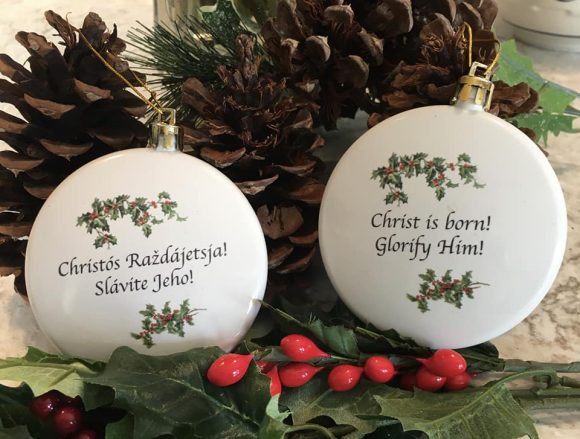
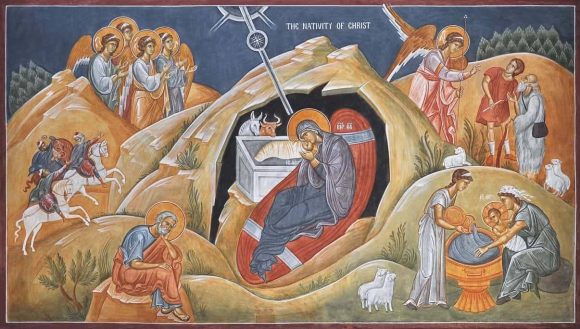
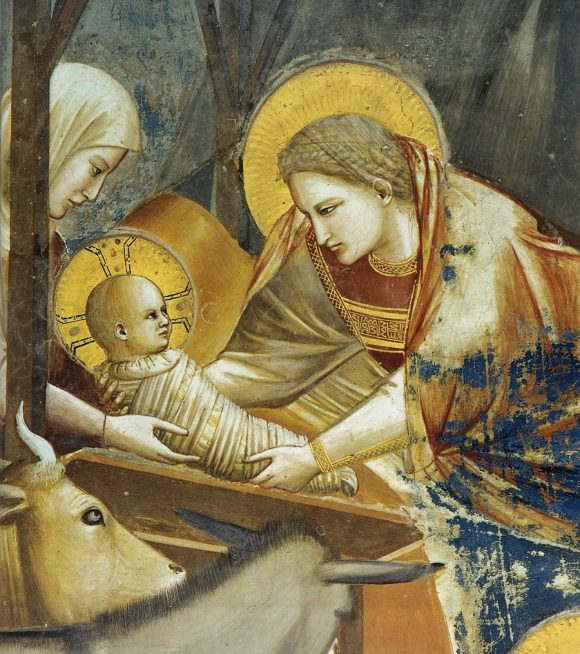
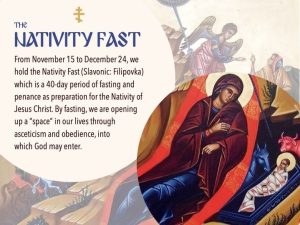

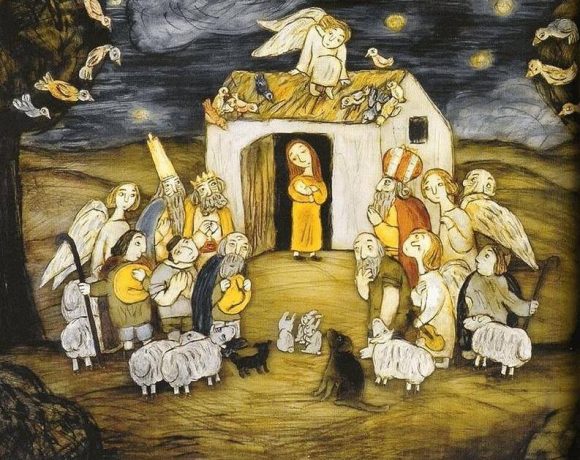
 The Christmas Day Liturgy Gospel is the story of the Magi, the astrologers from Persia, who discover the birth of the King of Kings by observing the stars. In this way, they are brought from the pagan superstition to worship of the one true God.
The Christmas Day Liturgy Gospel is the story of the Magi, the astrologers from Persia, who discover the birth of the King of Kings by observing the stars. In this way, they are brought from the pagan superstition to worship of the one true God.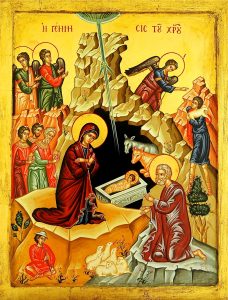 Christmas is a very special celebration for Ukrainians. Many traditions and rituals are observed, and each aspect of Christmas has a special meaning. Everyone is wearing their best clothes and the house has been cleaned top to bottom for the day, although all spider webs are left untouched. Legends about the generosity of spiders at Christmas mean they are not to be disturbed. What else is going on in the house?
Christmas is a very special celebration for Ukrainians. Many traditions and rituals are observed, and each aspect of Christmas has a special meaning. Everyone is wearing their best clothes and the house has been cleaned top to bottom for the day, although all spider webs are left untouched. Legends about the generosity of spiders at Christmas mean they are not to be disturbed. What else is going on in the house?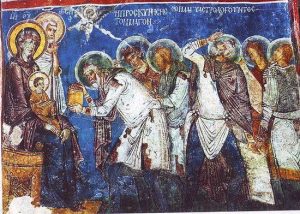 Meditation by Very Rev. Dr. David Petras
Meditation by Very Rev. Dr. David Petras